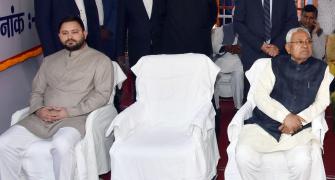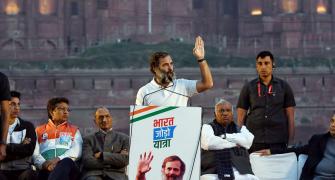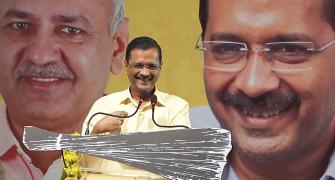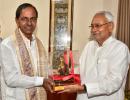Ever since Nitish embarked on the slippery path of trying to unite the Opposition against the BJP, he has repeatedly rebutted suggestions that the exercise was aimed at bringing himself centre stage.
The problem is: It is not enough if he says so.
Others have to say so as well, especially Congress, observes Aditi Phadnis.

Last month, the national council of the Janata Dal=United, or JD-U, unanimously passed a resolution authorising leader Nitish Kumar to resume talks over unity with all Opposition parties with the ultimate objective of ensuring that by the time the 2024 Lok Sabha election comes around, there will be one Opposition candidate against one of the Bharatiya Janata Party.
"Is evidence needed?" asks JD-U General Secretary K C Tyagi. "I was with the Congress' campaign team in Himachal Pradesh. The results show that the BJP can be defeated everywhere if Opposition parties are united."
"The Congress succeeded in making it a one-on-one contest against the BJP in HP. The BJP lost. But in Gujarat, the Aam Aadmi Party emerged as a third party opposing the Congress -- the very party that had done very well in 2017. The BJP benefited because of AAP in the fray. Had it been like 2017, the BJP would have been routed in Gujarat," says Tyagi.
But JD-U leaders say there are two problems here: One, unless the Congress jumps on the bandwagon, talk of unity is meaningless. Two, if the Congress comes on board, who would be the Opposition's candidate for prime minister?
The exercise was interpreted in two ways: One, with Nitish moving to the national stage, a vacancy would be created for the leadership of Bihar; and inevitably, the question: Was Nitish offering himself for the top job?
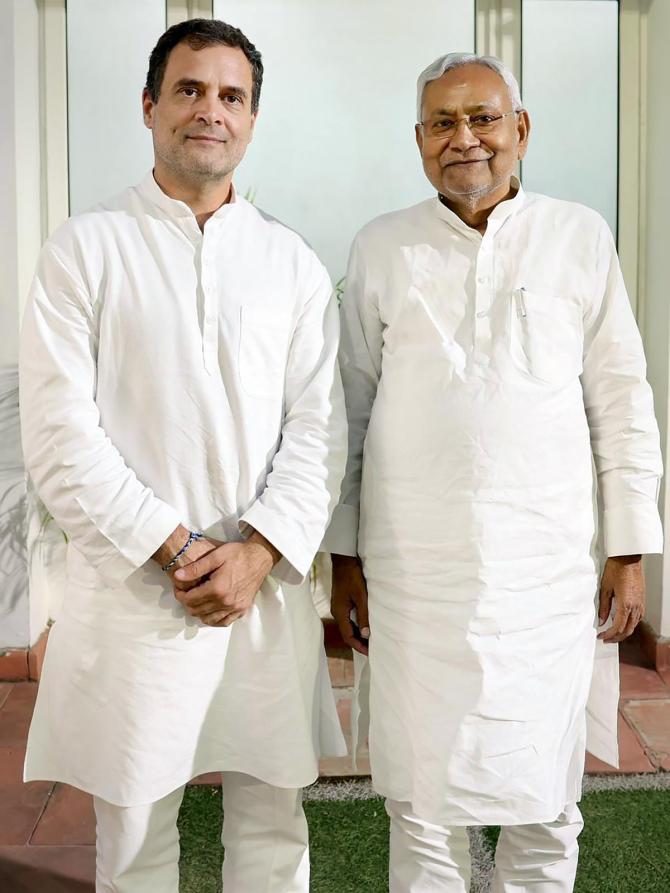
Ever since Nitish embarked on the slippery path of trying to unite the Opposition against the BJP, he has repeatedly rebutted suggestions that the exercise was aimed at bringing himself centre stage.
He has done everything to reassure everyone that he's just acting as an honest broker.
The problem is: It is not enough if he says so. Others have to say so as well, especially Congress.
"All we want is the Congress to endorse this in some way," says a top JD-U leader from Patna.
"To reassure the Congress, we have taken them into confidence from Day 1. When Nitish decided to part ways with the BJP and return to the Mahagathbandhan, the first person he called on was Sonia Gandhi.
"This was to convey to the Congress that the purpose of exiting the BJP alliance was to forge a larger Opposition unity. Following that, Nitish went to Delhi and met everyone in the Opposition, except Sonia.
"Then he went to Delhi a second time, this time with Lalu Prasad. They called on Sonia. But the response we expected was missing: To the extent, there was not even a photograph of the meeting on the Congress Twitter handle," he adds.
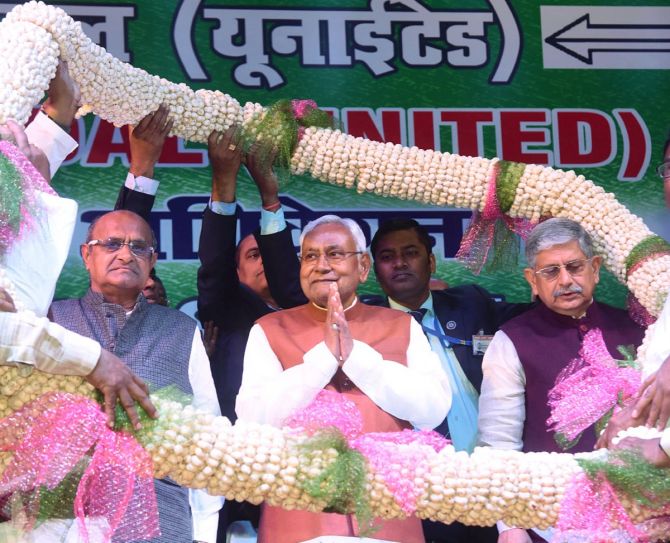
The JD-U believes privately that the other big Opposition party, the Trinamool Congress, might have reached some sort of understanding with the BJP and cites evidence of this: A lowering of the intensity of law enforcement action by central agencies, for instance.
As a result, it is ambivalent about joining a bigger Opposition platform.
The Telangana Rashtra Samithi, which has also announced a similar Opposition initiative, is too small to head it. But if all Opposition parties in North India could forge an understanding and create a common platform, it would be entirely possible to halt the BJP juggernaut.
Reflecting on this thinking, Nitish told the party's national council the BJP shouldn't labour under an illusion.
'The general atmosphere in the entire country is against it. They hide their monumental failures and magnify their small victories by shouting with the help of the media under their control. They are heading towards encountering the reality in 2024,' he said.
The only reaction from Sonia has been: All matters will be decided after the plenary of the party has met and elected a new president, a new working committee and other office-bearers. But that will happen only in February-March.
Publicly, Congress leaders are quick to react.
"You can't have unity in the Opposition and leave the Congress out of it,' says former Maharashtra chief minister Prithviraj Chavan.
"If any non-BJP outfit thinks any alliance sans the Congress can provide a stable government for five years, it is living in fool's paradise. There can never be any Opposition unity minus the Congress," says Jairam Ramesh, party general secretary and spokesperson.
But privately, Congress leaders say the problem is clear.

"Do you think Rahul Gandhi is walking 3,500 kilometres simply to make himself popular? Of course, not. There is a political reason behind this. There are many people associated with this exercise whose future hinges on promoting Rahul," says a top Congress leader and former Union minister.
"Unless you name Rahul as the only person who qualifies for the top job, the party is not going to come on board. It is a no-brainer -- that a one-on-one contest can make things difficult for the BJP. But even with a one-on-one contest, if the race is between Rahul and Narendra Modi, we're not sure if the Opposition would be able to achieve its objective (of displacing Modi)," the Congress leader adds.
For the Congress, the pitfalls are many.
One was identified by a scholar and well-known India hand at the Carnegie Endowment for International Peace Milan Vaishnav soon after elections to five states earlier this year.
He has analysed the data of all the assembly elections since 1962 and the Congress share, which shows an almost continuous downward trajectory.
"If current trends prevail, the Congress will be treated as a distraction rather than the default core of an anti-BJP coalition in 2024," observes Vaishnav.
The JD-U hopes it can persuade Congress to course-correct.
Feature Presentation: Rajesh Alva/Rediff.com


